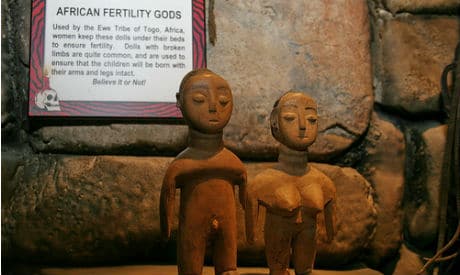
As Charles Darwin noted, the process of evolution can happen fairly quickly, or take generations to work itself out. And throughout the eons of history, there have often been overlapping evolving species of humans co-existing on the planet for long periods of time. While we've wandered the globe as the dominant — and only human — species for thousands of years, we may now be at one of those times. As obesity rates continue to rise and affect more than two-thirds of the U.S. population, fertility rates are expected to drop by as much as half cites new research out of the University of Colorado Advanced Reproductive Medicine.
The Centers for Disease Control defines obesity as having a body mass index (BMI) greater than or equal to age and sex specific 95th percentiles of CDC growth charts (for a 5'4" adult = 174 pounds or more, 5'9" = 203 pounds or more). According to John Hopkins Bloomberg School of Public Health, at least 66 percent of U.S. adults are now either overweight or clinically obese per the CDC definitions. And, by 2015, more than 75 percent of all U.S. adults are projected to be overweight or obese!
We know that obesity leads to diet related illnesses including heart disease, stroke and type II diabetes. And, Dr. Alex Polotsky of the University of Colorado Advanced Reproductive Medicine, author of "Obesity and Female Fertility" (Endocrine News, June 2012), says it's also having a profound impact on fertility rates. He notes that both obese women and men contribute to problems with conception.
The American Journal of Obstetrics and Gynecology notes that that obese women increase their risk of fertility issues by 120 percent, increase their risk of marriage by 67 percent and increase the risk of birth defects for their children by a whopping 124 percent. Obese men, says Polotsky, have a 42 percent greater risk of lower sperm levels, and an 80 percent greater risk of having a zero sperm count as compared with men in the healthy normal weight range.
Research has also shown that when one person in a relationship is obese or overweight, the other one often is too, and that combination can increase the risks of infertility or problems during the pregnancy. And, adds Polotsky, losing weight may not be able to fix the problems, either.
Obesity may be affecting fertility rates for others on the planet as well, in an indirect manner, according to data released by the British Medical Council. Americans, which account for just 6 percent of the world's population, makes up 34 percent of the world's obese population. Obesity contributes 15 million tons of the global human biomass—the equivalent of another half billion humans!—putting pressure on resources, including food. Malnutrition and other food scarcity issues can also contribute to an increased risk for infertility in both men and women.
A 2005 report published by The New England Journal of Medicine found that childhood obesity—which now affects one-fifth of U.S. children—could, for the first time, see parents with longer life expectancy rates than their offspring, further impacting the course of human evolution.
Jill Ettinger is a Los Angeles based writer, editor and photographer. She regularly consults with and supports emerging brands and organizations in creative communication, social media strategies and event production. For more info, visit www.jillettinger.com. Keep in touch with Jill on Twitter @jillettingerKeep in touch with Jill on Twitter @jillettinger
Resources:
http://www.cdc.gov/obesity/data/adult.html#baseline
http://www.nytimes.com/2005/03/17/health/17obese.html




